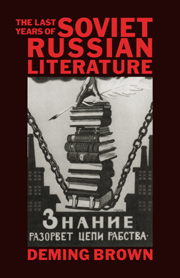Book contents
- Frontmatter
- Contents
- Preface
- Acknowledgments
- 1 The literary situation: publication, genres, criticism
- 2 From “stagnation” to “openness”
- 3 Retrospective writing about the Stalin period
- 4 Village prose: its peak and decline
- 5 The “forty-year-olds”
- 6 Other voices
- 7 “Tough” and “cruel” prose
- 8 New faces
- 9 Conclusion
- Notes
- Select bibliography
- English translations of Soviet Russian prose
- Index
3 - Retrospective writing about the Stalin period
Published online by Cambridge University Press: 13 October 2009
- Frontmatter
- Contents
- Preface
- Acknowledgments
- 1 The literary situation: publication, genres, criticism
- 2 From “stagnation” to “openness”
- 3 Retrospective writing about the Stalin period
- 4 Village prose: its peak and decline
- 5 The “forty-year-olds”
- 6 Other voices
- 7 “Tough” and “cruel” prose
- 8 New faces
- 9 Conclusion
- Notes
- Select bibliography
- English translations of Soviet Russian prose
- Index
Summary
Soviet commentators often and fondly quoted Woland's statement in Bulgakov's The Master and Margarita that “manuscripts don't burn.” Many of the works mentioned in the present chapter were originally “repressed” manuscripts that had been accumulating in archives and desk drawers for decades. In the mid-1980s, such works flooded publishing houses and were consumed eagerly by rapidly increasing numbers of Soviet readers.
The newly discovered works included many that had long been known in the West. Examples are Evgenii Zamyatin's dystopian novel We, Boris Pasternak's Doctor Zhivago, and Anna Akhmatova's Requiem, a cycle of poems about the suffering of Russian women under Stalin's terror. These works, and many other newly revealed treasures from twentieth-century Russian writing, had been known in varying degrees by the Soviet literati, who for years had been reading them in circulated manuscript form or in foreign editions smuggled into the USSR. For the broad reading public, however, such works were a revelation.
Until the Gorbachev era, these works were all politically and ideologically taboo. So were a great many writings by more contemporary authors, living or recently deceased, whose criticisms of the Stalin era in particular were thought to be too vivid, frank, and powerful to bear the light of day. Under the new circumstances, this literature represented a massive re-examination of the national experience.
- Type
- Chapter
- Information
- The Last Years of Soviet Russian LiteratureProse Fiction 1975–1991, pp. 62 - 78Publisher: Cambridge University PressPrint publication year: 1993



